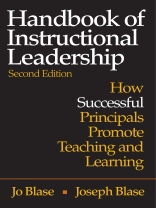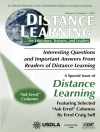Updated Edition of Bestseller!
Build a learning community of teachers and students through mastering the art of effective leadership!
The first edition of this classic text was based on a landmark study in which the authors surveyed over 800 K-12 teachers to find how the best principals encourage teacher growth and professionalism. The answers provided conclusive evidence that the most successful principals act as instructional leaders who advocate teacher development that enhances students′ learning. The updated and expanded second edition presents new research by the Blases, along with the most recent research and insights to support the text′s groundbreaking theory.
Successful instructional leaders inspire their staff to develop ‘professional learning communities’ dedicated to effective teaching practices. New to the second edition is an in-depth analysis that shows principals how to achieve this goal. Also new are additional figures, models, and reading lists that enrich the text′s original findings.
Time-tested practices of instructional leadership are still central features. Principals can use these keys to success to:
- Build teachers′ trust through continual communication
- Encourage teachers to continue their self-improvement efforts
- Motivate teachers with constructive feedback
- Promote and participate in reflective practices
- Support and encourage teachers′ professional development
Encourage your teachers to be their best through supportive collaboration and communication. Practice real instructional leadership and develop a ‘professional learning community’ in which effective teaching promotes continued learning.
Daftar Isi
Foreword – Stephen P. Gordon
Preface
Acknowledgments
About the Authors
Dedication
Part I. The Art and Science of Instructional Leadership
1. The Craft of Teacher Supervision
Our Study
The Instructional Supervision Legacy: From Control to Collaboration
Research on Instructional Supervision
Current Issues in the Field
2. The Conference: Heart of Instructional Supervision
Successful Approaches
Research on Instructional Conferences
Our Findings
Summary
3. Staff Development: Promoting Professional Growth
Research on Teaching and Learning
How Do Teachers Learn? Principles That Shape Staff Development
Our Findings: The Lifelong Study of Teaching and Learning
PSSSSST! Redesign
Tips for Leaders
Summary
4. Reflection: Encouraging Critical Study
The Need for Reflective Practice
Related Research and the Development of Frameworks for Reflective Thinking
Approaches to Reflective Supervision
Our Study: Characteristics of Teacher Reflection
Principal Behaviors Fostering Reflection in Teachers and the Benefits to Teachers
Cognitive Coaching: Bridge to Reflection
Encouraging Reflection: Helpful Reminders
Portrait of a Facilitator for Reflective Practice
Part II. How Supervisors′ Behaviors – Positive and Negative – Affect Teachers
5. Being Visible Versus Interrupting and Abandoning
Visibility by Wandering Around
Interruption of Class Instruction
Abandonment
6. Praising Versus Criticizing
Praise
Criticism: More About Control
7. Extending Autonomy Versus Maintaining Control
Extending Autonomy
The Control Orientation and Instructional Leadership
Other Aspects of Control
Goals of Principals′ Control Orientation
The Abusive Control Orientation: The Worst of All
Summary
8. Conclusion: The Successful Instructional Leader
What, Then, Is Successful Instructional Leadership or Supervision?
Successful Leadership Vis-à-vis Instruction
Tips for Principals
Linking Instructional Leadership to the Development of a Professional Learning Community
9. Instructional Leadership: A Bridge to the Development of a Professional Learning Community
Recruiting for a Professional Learning Community
Professional Learning Communities: Findings From Research
Suggestions for Expanding Successful Instructional Leadership to Develop a Professional Learning Community
Everyone an Academic Leader
More to Learn: A Final Word
Resource: Research Method and Procedures
References
Index
Tentang Penulis
Joseph Blase is a professor of educational administration at the University of Georgia. Since receiving his Ph.D. in 1980 from Syracuse University, his research has focused on school reform, transformational leadership, the micropolitics of education, principal-teacher relationships, and the work lives of teachers. His work concentrating on school-level micropolitics received the 1988 Davis Memorial Award given by the University Council for Educational Administration, and his coauthored article published in the Journal of Educational Administration won the W. G. Walker 2000 Award for Excellence. In 1999 he was recognized as an elite scholar, one of the 50 Most Productive and Influential Scholars of Educational Administration in the world. Blase’s books include The Politics of Life in Schools: Power, Conflict, and Cooperation (winner of the 1994 Critic’s Choice Award sponsored by the American Education Studies Association), Bringing Out the Best in Teachers (1994, 2000, 2008); The Micropolitics of Educational Leadership (1995), Empowering Teachers (1994, 2000), Democratic Principals in Action (1995), The Fire Is Back (1997), Handbook of Instructional Leadership (1998, 2004), Breaking the Silence (2003), and Teachers Bringing Out the Best in Teachers (2006). His recent research (coauthored with Jo Blase and Du Fengning, 2008), a national study of principal mistreatment of teachers, appeared in The Journal of Educational Administration. Professor Blase has published over 120 academic articles, chapters, and books.












